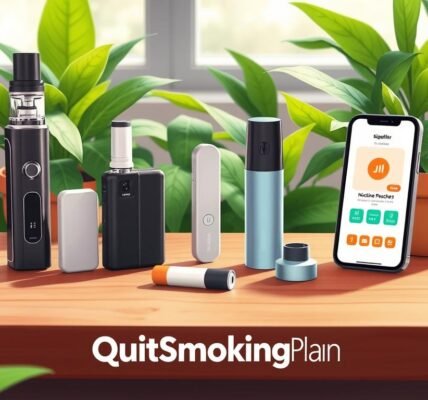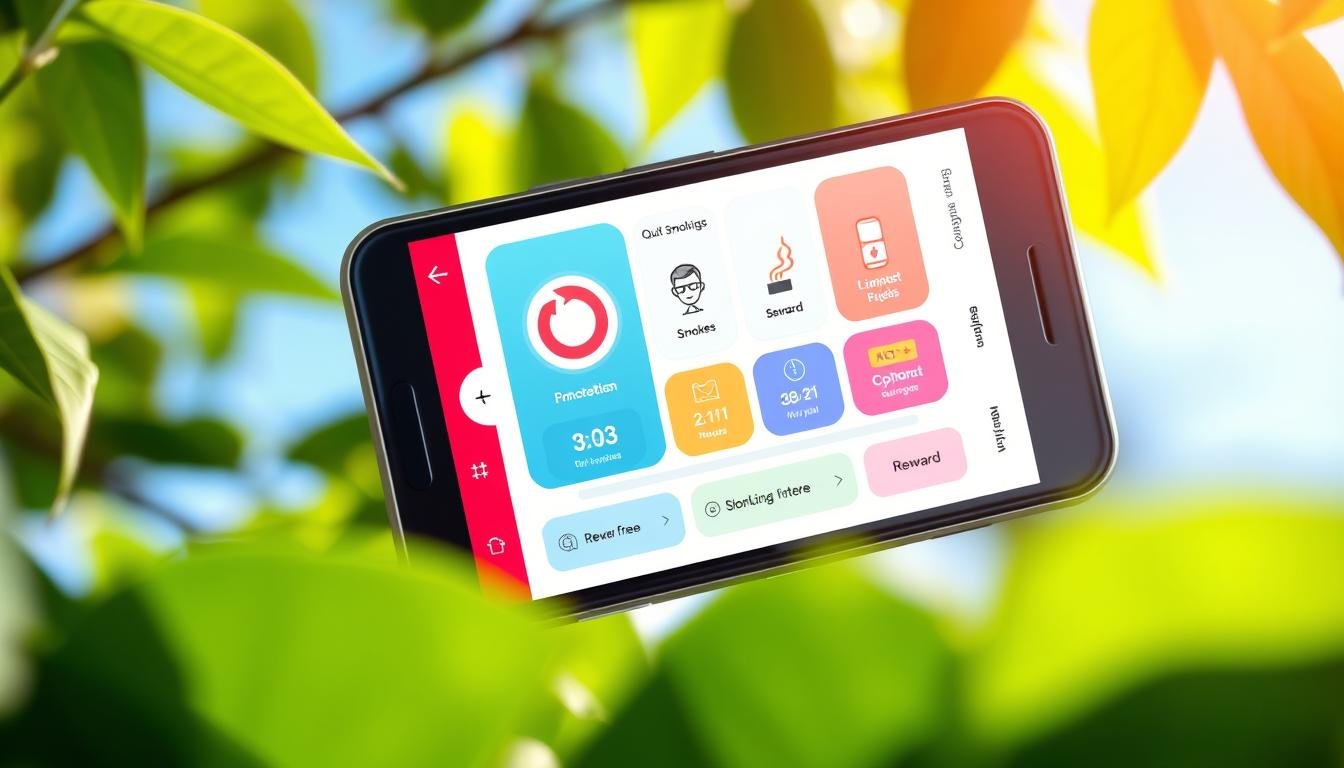“Our greatest glory is not in never falling, but in rising every time we fall.” – Confucius. This saying is very meaningful for those fighting addiction. Knowing the triggers for smoking relapse is key to creating strong relapse prevention strategies.
Relapse is a big worry for those trying to quit smoking. Many emotional, environmental, and social factors can lead to it. Finding out what these smoking relapse factors are can help you stay on track in your recovery. Studies show that both inside feelings and outside things greatly affect staying sober.
By knowing your personal triggers, you can make a solid plan for lasting recovery. This way, you avoid the dangers of smoking cessation strategies that ignore these important points. Also, research shows that being mindful of your surroundings is vital in fighting off relapse in addiction recovery1.
Key Takeaways
- Understanding your personal triggers is key to overcoming addiction.
- Both emotional and environmental factors contribute to relapse risk.
- Identifying effective smoking cessation strategies can improve recovery outcomes.
- Contextual influences are crucial in preventing relapse.
- Awareness of social settings can help navigate potential relapse scenarios.
Understanding Relapse Triggers
Knowing your relapse triggers is key to staying sober. These triggers can be emotional, environmental, or social. They can make you crave substances after you’ve been clean for a while. Stress, emotional ups and downs, and certain people or places can make cravings strong again.
It’s important to spot these triggers early on. This way, you can take steps to avoid them. Understanding what sets off cravings helps you stay on track with your recovery.
Spotting triggers is a big part of avoiding relapse. For example, mood swings and anxiety during withdrawal can make you feel worse. Physical symptoms like sweating and tremors can make these feelings even stronger. This can increase your chance of falling back into old habits.
Studies show that how bad withdrawal symptoms are can vary. This depends on your health and how much you drank2.
Managing these challenges is possible. Recognizing the emotional and physical signs of addiction is a good start. Using Cognitive Behavioral Therapy (CBT) can help you deal with triggers better3.
Having a strong support system is also crucial. It helps you handle cravings more effectively. By knowing your personal triggers, you can develop strategies to keep you on the path to recovery.
Common Internal Triggers for Relapse
Understanding internal triggers is key to your recovery. These triggers come from emotional states that lead to cravings. Feelings like anxiety, depression, guilt, or shame often cause relapses. It’s important to recognize these emotions to manage them well.
Emotional Responses
Recovery brings many emotional challenges. Anxiety can make it hard to stay focused. By recognizing these emotions, you can find ways to deal with them before they get worse.
Using cognitive behavioral therapy (CBT) can help. It teaches you to handle these feelings without turning to substances.
Negative Thoughts and Self-Doubt
Negative thoughts and self-doubt can harm your mental health. Feeling not good enough can make you more likely to relapse. Journaling and mindfulness can help you see yourself in a better light.
It’s crucial to face these feelings head-on. Doing so helps keep your recovery on track and prevents relapse.

For more help with managing internal triggers, check out recovery-focused activities. They can support your journey4.
Common External Triggers for Relapse
It’s important to know what can lead you back to old habits. These triggers can be found in different places and people. Knowing what to stay away from can help you stay sober.
Places Associated with Past Use
Bars, clubs, and certain neighborhoods can bring back bad memories. These places can make you want to use again. It’s better to find new, safe places to hang out.
Creating a safe space helps you avoid relapse. Knowing what places to avoid helps you stay on track.
People and Environments
Being around people who use drugs can be dangerous. It’s also risky to be around those who don’t care about your recovery. Good friends can help you stay strong.
Choosing the right friends is key. They should support your recovery. This way, you can avoid bad influences and stay focused on getting better.
Triggers for Smoking Relapse
Understanding what leads to smoking relapse is key to your recovery. Knowing your smoking triggers can help you stay on track. These triggers can be emotional states or social situations that make you want to smoke. By identifying them, you can make better choices about your nicotine addiction.
Identifying Smoking Triggers
Cravings for cigarettes usually last just a few minutes5. Spotting these triggers early can help you find ways to resist them. Stress, for example, can make you more likely to smoke, so finding other ways to relax is important5.
Seeing someone smoke, even on TV, can also trigger cravings5. So, it’s crucial to know what situations and feelings make you want to smoke.
Impact of Social Settings
Social situations can make it hard to resist smoking urges. Being around people who smoke or in places where smoking is common can make cravings worse. Drinking alcohol, for instance, can weaken your willpower and make you more likely to smoke5.
Having supportive friends who don’t smoke can help you quit6. Also, doing physical activities like walking or swimming can help you feel less like smoking6.
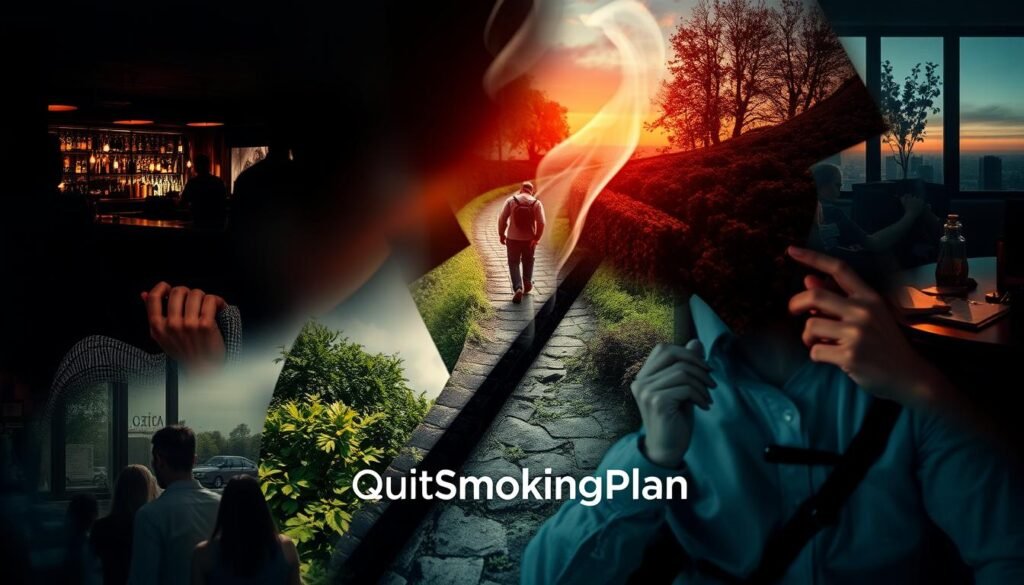
To handle social situations better, you might want to limit your time in places where smoking is common. Using distractions or getting support from friends can help you stay strong. Changing how you deal with social triggers is a big part of overcoming your addiction56.
The Role of Stress in Relapse
Stress is a big trigger in recovery, making relapse more likely. Over 63% of people say work is their main stress source7. This shows how important it is to manage stress in recovery well.
Stressors like tough jobs, money worries, and tough relationships can make anxiety and depression worse8.
Using stress reduction techniques is key to fighting these stressors. Companies that support mental health and create a positive work environment can help a lot7. Also, taking care of yourself through exercise, relaxation, and sleep is vital for your mental health8.
Being proactive about stress can change your recovery path. By using good stress management, you can build a strong base against relapse.
Recognizing Boredom as a Trigger
Boredom is often seen as a small issue in recovery. But it’s really a big deal. It can lead to old habits coming back. So, it’s key to manage boredom to stay on track.
Trying new things can help a lot. It keeps your mind busy and stops old habits. Finding fun activities fills your time well.
Here are some ideas for things to do:
- Reading a new book or exploring different genres
- Joining a local sports team or fitness class
- Taking up cooking or baking
- Exploring art or craft projects
- Volunteering in your community
Acting on boredom can lead to better habits. It lowers the chance of falling back into old ways. Being aware and active in finding fun activities is crucial for recovery.
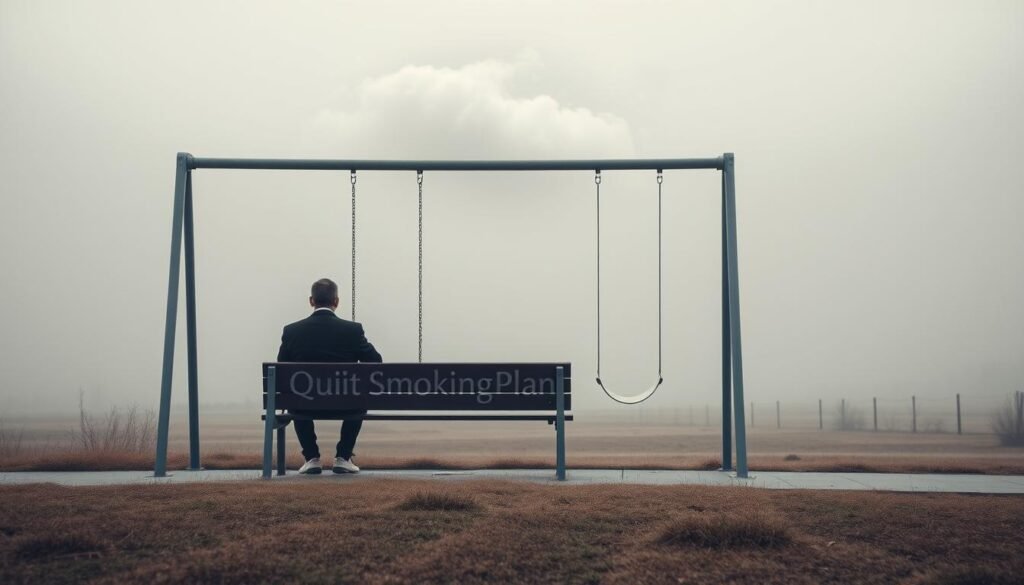
Managing Relationship Issues
Your relationships play a big role in your recovery journey. Dealing with relationship problems in recovery is tough. It’s key to have a support system of caring friends or family.
Strong connections offer emotional support when you need it most. Keeping communication open shows your commitment to healthy relationships in recovery.
Support Systems
Building a strong support system takes effort and thought. Surround yourself with people who respect your recovery choices. This makes you feel safe.
Use resources like activities and worksheets to improve relationships. These tools help you understand triggers and strengthen bonds with supporters. Icebreaker activities are a great way to start improving relationships.
Communication Skills
Good communication is key to expressing your needs and feelings without turning to substances. Using effective communication techniques leads to healthier interactions with loved ones. Skills like active listening and being assertive help avoid misunderstandings and keep trust strong.
Talking with compassion and clarity helps avoid relapse triggers from relationship problems.
In summary, building support systems and improving communication are crucial for managing relationship issues in recovery. By using these strategies, you can create a supportive environment for lasting sobriety3.
Impact of Financial Stress on Relapse
Financial stress can make recovery tough. It can lead to feeling anxious and hopeless. This might make you turn to substances for quick relief.
It’s key to tackle financial stress head-on. Making a budget or getting financial advice can help. These steps can ease your financial worries and boost your mental health.
Studies show a clear link between money troubles and relapse. A Digital Health Reviews journal paper highlights this. It says financial stress can trigger relapse because of anxiety over money9.
Good financial habits can greatly aid your recovery. Here are some strategies to consider:
- Make a budget to keep track of money coming in and going out.
- Look for help from financial advisors or counselors.
- Use community resources to tackle financial issues.

Recognizing Warning Signs in Recovery
It’s key to know the warning signs in recovery to keep moving forward and avoid relapse. Look out for emotional relapse signs, which are early signs of bigger problems. Pay attention if you start ignoring self-care or pulling away from friends. Spotting emotional triggers helps you handle feelings that could lead to relapse, helping you find better ways to cope.
Defining Emotional Relapse
Emotional relapse happens before you might start using again. It shows as more negativity, feeling alone, and less self-care. Spotting these signs early is crucial. Here are some important signs to watch for:
- Increased irritability or mood swings
- Neglecting healthy routines
- Avoiding social interactions
- Heightened feelings of anxiety or depression
By catching these signs early, you can get help and stop relapse3. Staying alert to your mental health shows you’re serious about recovery.
Strategies for Coping with Triggers
It’s key to find good ways to deal with triggers to keep your recovery on track. Doing healthy things and going to therapy can really help you stay on the right path.
Developing Healthy Habits
Creating healthy habits is a great way to fight triggers. Regular exercise, eating right, and getting enough sleep can help you resist cravings. Try adding activities like jogging or yoga to your day.
These changes can help you handle triggers better by improving your body and mind.
Utilizing Therapy and Support Groups
Therapy can give you tools to fight triggers. Cognitive-behavioral therapy is especially good at changing bad thoughts and controlling cravings. Support groups are also crucial for staying on track.
Sharing your struggles with others can help you feel connected and accountable. Remember, asking for help is a sign of strength, not weakness.

How to Avoid Smoking Relapse
Avoiding smoking relapse is a journey that needs strategy and commitment. You can boost your success by setting clear goals and establishing boundaries. These steps help you stay focused and strong.
Setting Goals and Boundaries
Clear goals keep you motivated. Specific, measurable goals help you see your progress. Studies show that parents talking to their kids about smoking risks can stay smoke-free twice as long as those who don’t10.
Setting boundaries is also key. Know the situations, places, or people that might make you want to smoke. By avoiding these triggers, you stay true to your smoke-free promise. Sharing smoking risks with kids can make you 58 percent more likely to stay smoke-free10.
Creating a Sober Environment
A supportive environment is crucial for recovery. Make your home smoke-free by removing all smoking items. This step shows your commitment to quitting.
Having a space for relaxation or hobbies can also help. A clean, encouraging environment boosts mental health and recovery. Quitting smoking early can lower your kids’ smoking risk by up to 40 percent10.
Physical Illness and Mental Health
It’s key to know how physical health and mental health connect for those trying to stay sober. When you’re dealing with health problems, stress can go up, making it harder to stay sober. Chronic conditions can make you feel like you’re not doing well, which can lead to cravings.
But, you can manage these issues by taking care of your overall health. This approach helps you stay on track with your sobriety journey.
Understanding the Connection to Relapse
Physical health and the risk of relapse are closely linked. People with bipolar disorder face special challenges. Bipolar disorder affects millions globally11.
It can make managing your mental health harder. For instance, marijuana can cause manic episodes and worsen depression. It can also mess with medication for bipolar symptoms11.
Working with healthcare providers who get addiction is helpful. They help you manage both physical and mental health issues. They consider treatment side effects like weight gain and dizziness11.
Therapies like cognitive-behavioral therapy and family-focused therapy can also help. They improve emotional stability and family communication11.
Knowing how physical illness and mental health are connected helps you recover better. Focusing on managing these areas can make your sobriety journey stronger.
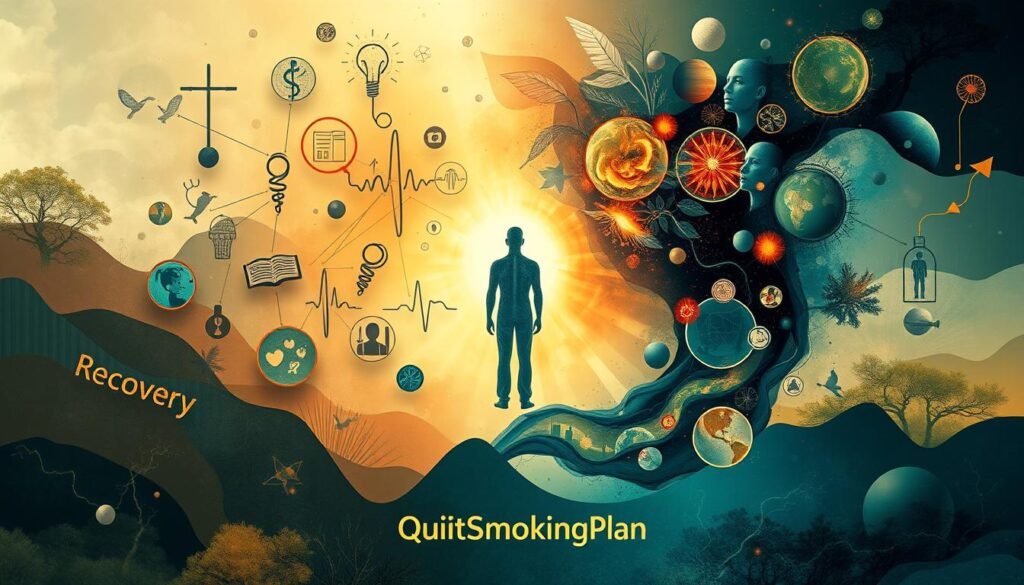
Building Confidence Without Complacency
Building confidence in recovery is key to staying sober. It’s important to balance feeling sure of yourself and avoiding too much confidence. Too much confidence can make you think you don’t need to keep working on staying sober. Always staying alert is crucial to avoid getting too comfortable, which could harm your progress.
Avoiding Overconfidence
Being self-aware is vital during your recovery. Knowing when you might be getting too comfortable helps you take action. Regularly checking in with yourself and your goals keeps you focused. To keep your confidence up without getting too cocky, try:
- Joining support groups.
- Going to recovery workshops to learn more.
- Practicing mindfulness and meditation to improve self-awareness.
Talking openly with your support network also helps you stay committed to sobriety. Complacency can lead to temptations that could derail your sobriety. By managing complacency, you keep a healthy mindset focused on keeping up with your recovery efforts.
| Strategies | Description |
|---|---|
| Regular Self-Assessment | Evaluate your progress and feelings regularly to maintain awareness. |
| Stay Engaged in Recovery Programs | Continually take part in programs that support your sober journey. |
| Develop New Skills | Focus on practical skills that contribute to your personal growth. |
By focusing on self-awareness and tackling overconfidence, you improve your ability to prevent relapse. Creating a culture of ongoing growth helps you keep moving forward in your recovery journey12133.
Conclusion
Understanding and managing relapse triggers is key to staying smoke-free. Recognizing what might lead you to relapse helps you make plans just for you. This summary stresses the need for constant self-awareness, support, and proactive steps in your recovery.
When facing recovery’s ups and downs, watch out for emotional and social triggers. Managing these can make your commitment stronger and boost your emotional strength. Using resources to spot these triggers can greatly improve your success rate.
By choosing healthy habits and talking openly with your support group, you can lower relapse risks. What you’ve learned about managing triggers will help you on your path to lasting sobriety. For more on this, check out resources on infant health impacts from opioid exposure, found at this reference14.
FAQ
What are the most common triggers for relapse?
How can I understand and identify relapse triggers?
What are some common internal triggers for relapse?
What external triggers should I be aware of?
How can I identify specific smoking triggers?
What role does stress play in relapse?
How can I cope with feelings of boredom as a trigger?
What are effective strategies for managing relationship issues in recovery?
How does financial stress affect the risk of relapse?
What are the warning signs of emotional relapse?
How can I develop healthy habits to cope with triggers?
How can therapy and support groups help with relapse prevention?
What steps can I take to avoid smoking relapse?
How do physical illness and mental health challenges affect relapse risk?
How can I build confidence in my recovery without becoming complacent?
Source Links
- https://ccsme.org/wp-content/uploads/2024/06/Liese-CBT-Maine-handout.pdf
- https://relevancerecovery.com/blog/understanding-the-physical-and-emotional-withdrawal-symptoms-from-alcohol-a-comprehensive-guide/
- https://www.takingtheescalator.com/group-activities-by-topic
- https://www.army.mil/e2/downloads/rv7/r2/policydocs/r600_85.pdf
- https://www.webmd.com/smoking-cessation/ss/slideshow-smoking-triggers
- https://zeusjuice.uk/ten-tips-for-quitting-smoking-for-good/
- https://www.addictioncenter.com/news/2024/08/connecticut-senators-addiction-occupational-disease/
- https://delamere.com/blog/work-and-stress-managing-it-and-when-to-get-help
- https://www.cmich.edu/docs/default-source/academic-affairs-division/research-and-graduate-studies/graduate-studies/2024-scree-student-abstracts.pdf?sfvrsn=48a3d8cd_4
- https://madison365.com/talking-to-kids-about-smoking-risks-may-help-parents-quit/
- https://www.rosewoodrecovery.com/blog/how-marijuana-use-complicates-bipolar-disorder
- https://www.gamblingtherapy.org/forum/topic/day-1-starts-tomorrow/
- https://www.med.navy.mil/Portals/62/Documents/NMFA/NMCPHC/root/Field Activities/Pages/NEPMU6/Operational Support/OPNAVINST-5102.1D-w-CH-2-Mishaps.pdf
- https://pmc.ncbi.nlm.nih.gov/articles/PMC7605356/


